Unit 6 When was it invented 单元知识点归纳 人教版九年级英语全一册
文档属性
| 名称 | Unit 6 When was it invented 单元知识点归纳 人教版九年级英语全一册 | 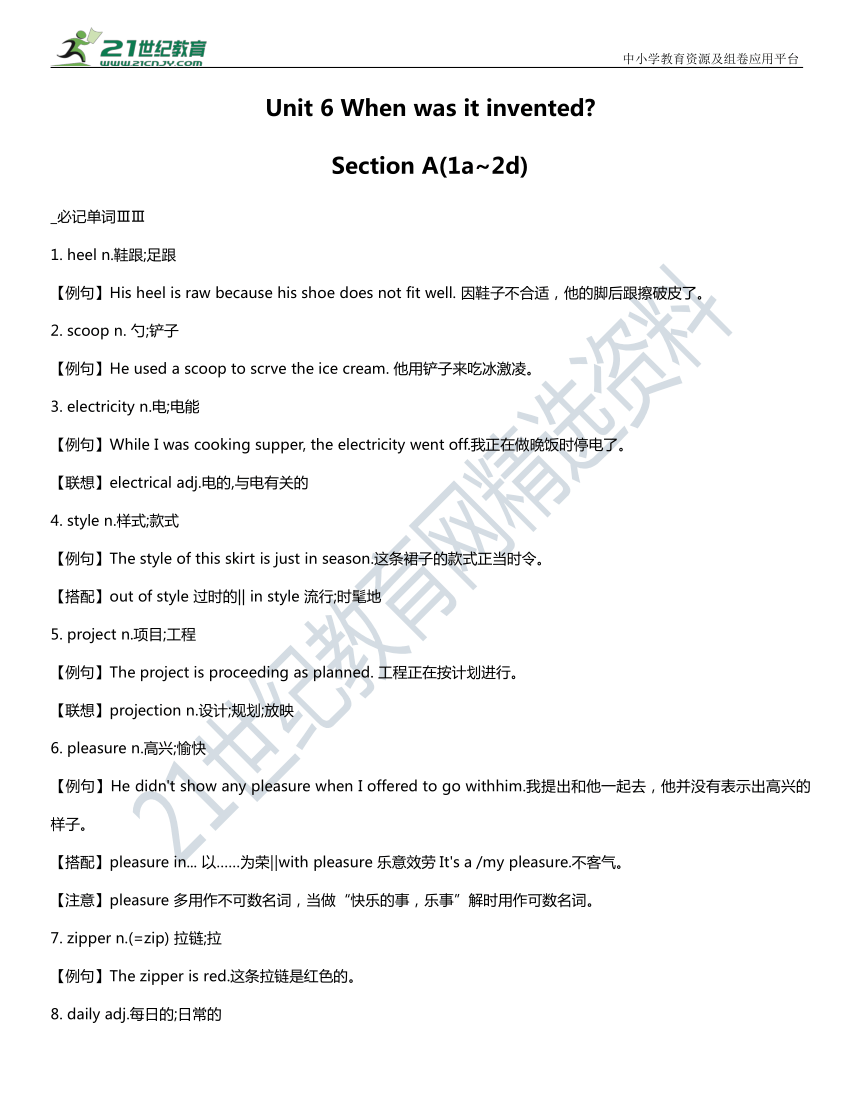 | |
| 格式 | docx | ||
| 文件大小 | 164.2KB | ||
| 资源类型 | 试卷 | ||
| 版本资源 | 人教新目标(Go for it)版 | ||
| 科目 | 英语 | ||
| 更新时间 | 2023-09-09 15:58:54 | ||
图片预览

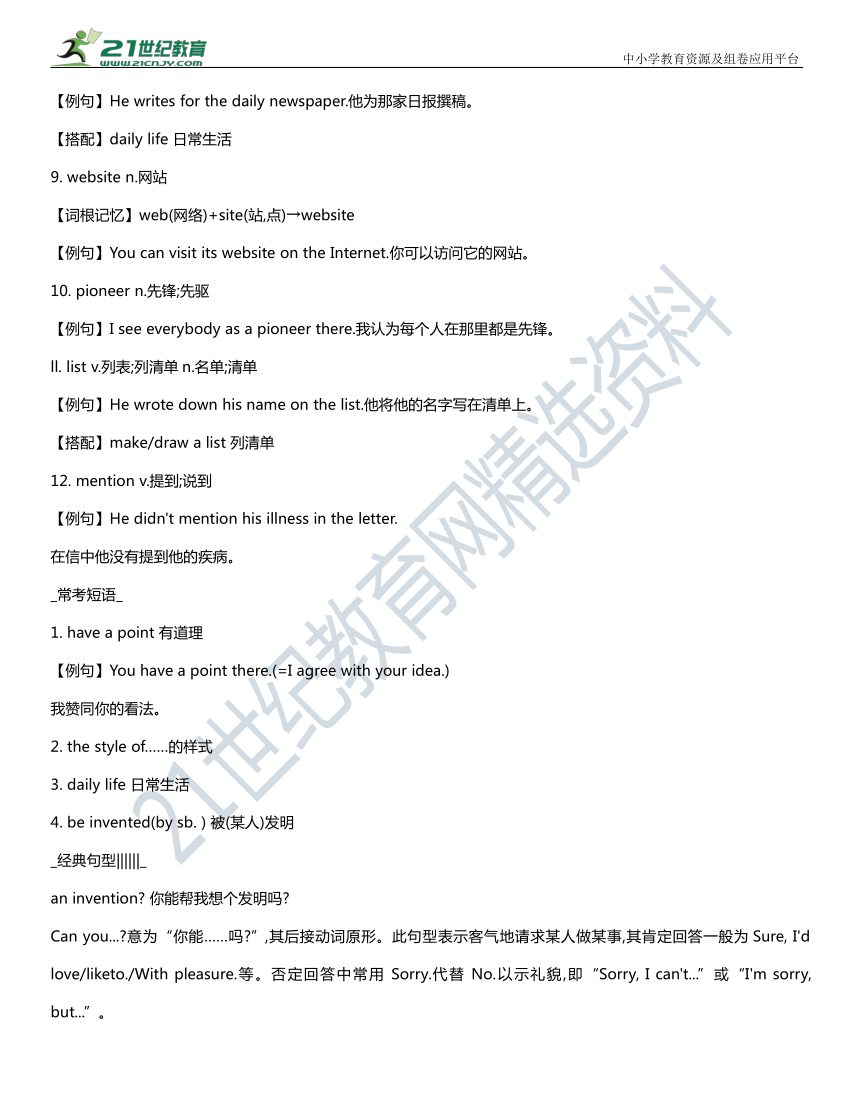
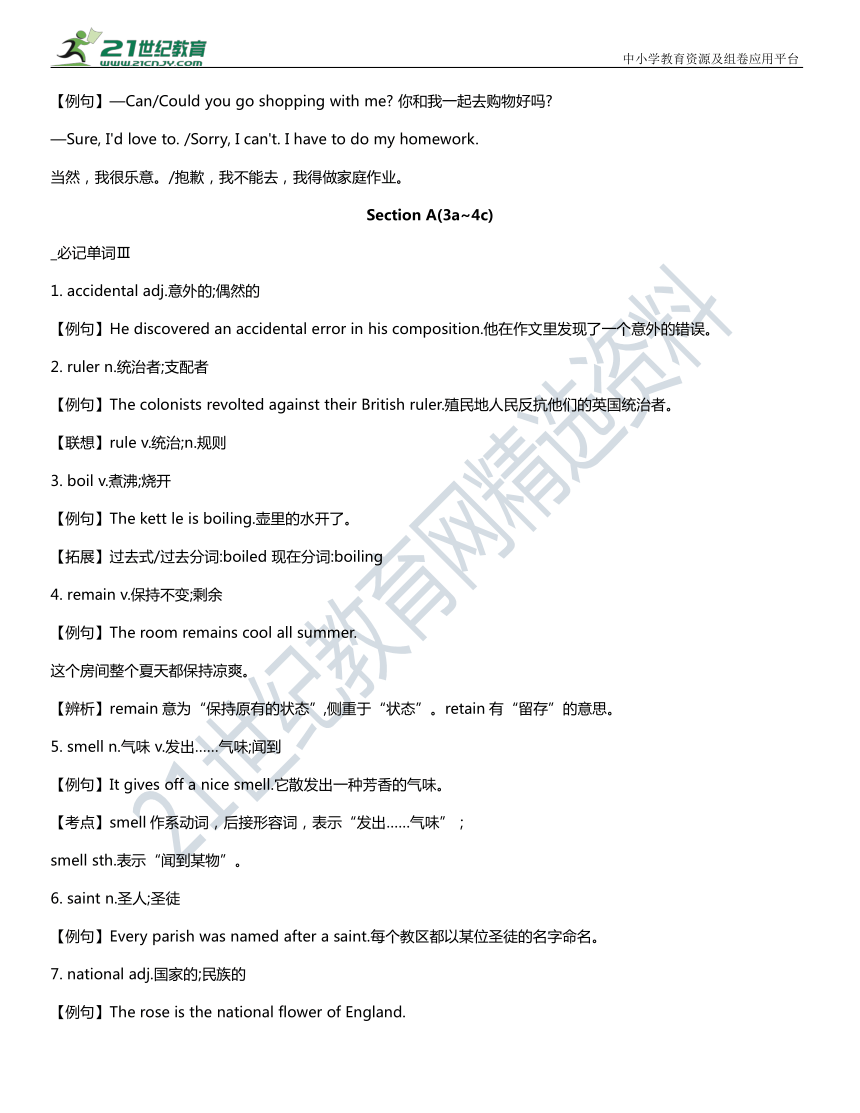
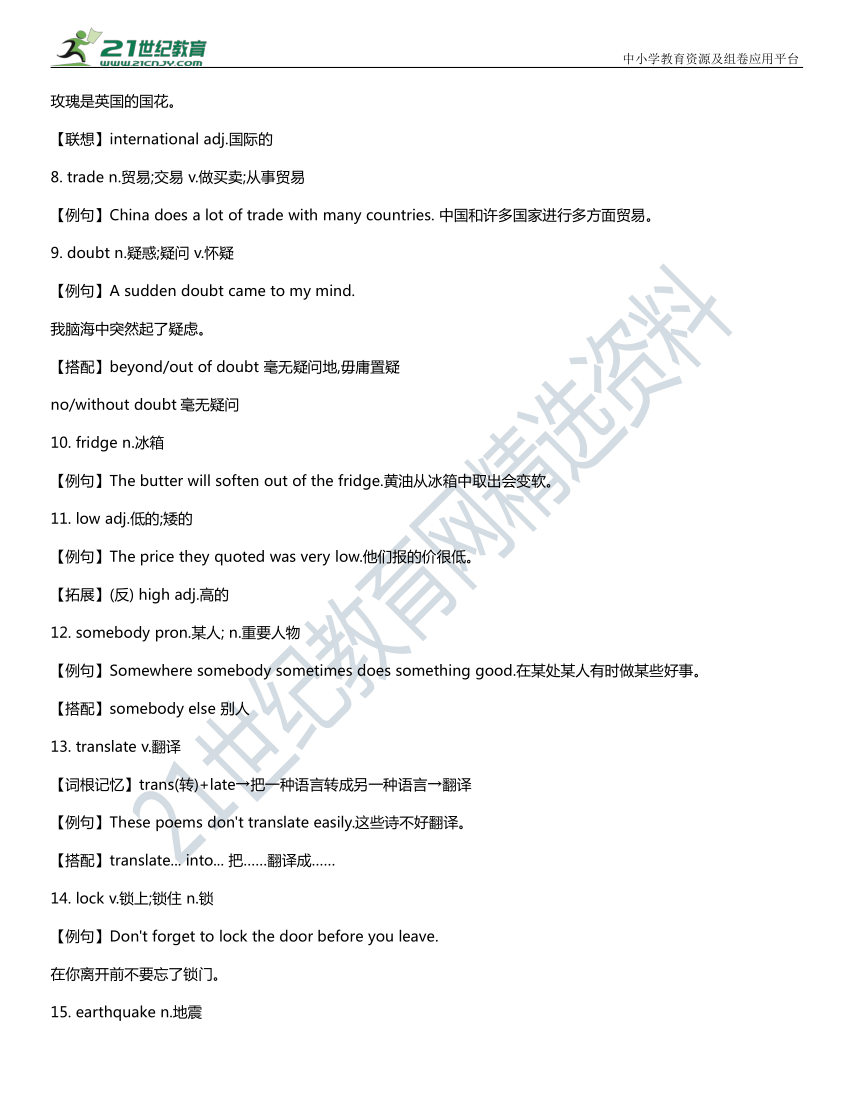
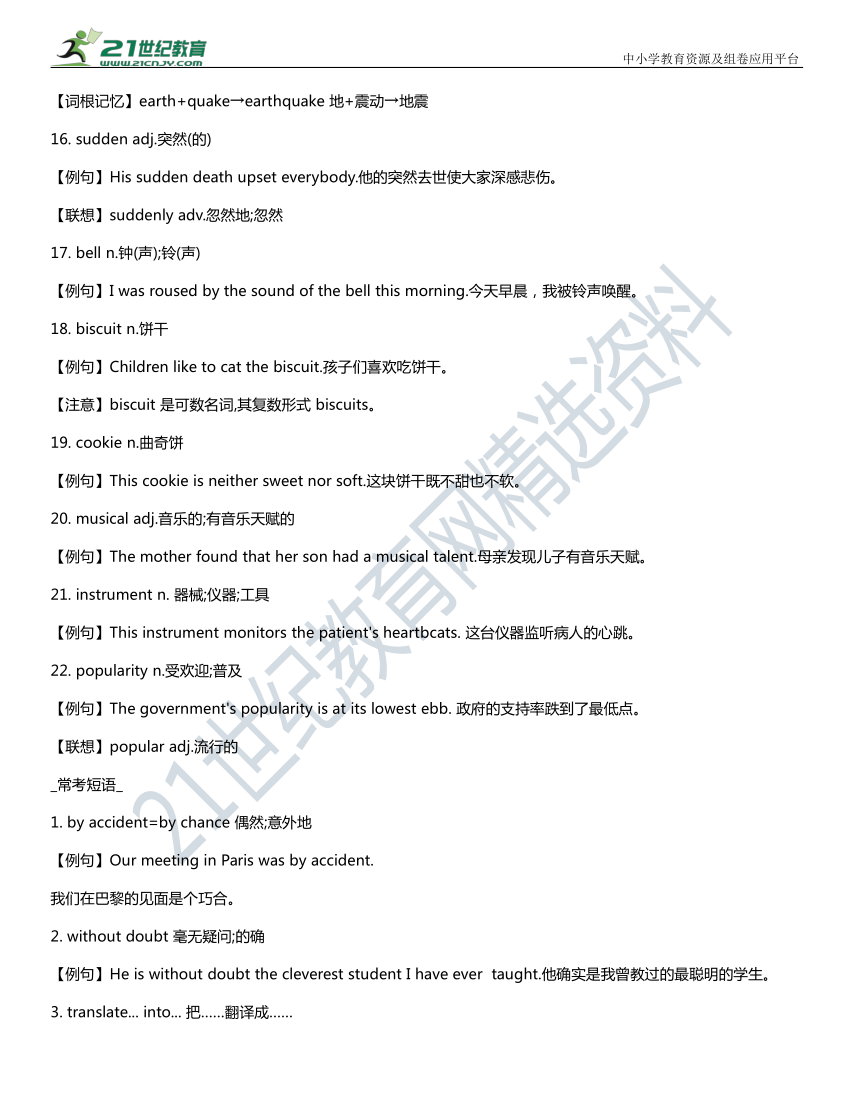
文档简介
中小学教育资源及组卷应用平台
Unit 6 When was it invented
Section A(1a~2d)
_必记单词ⅢⅢ
1. heel n.鞋跟;足跟
【例句】His heel is raw because his shoe does not fit well. 因鞋子不合适,他的脚后跟擦破皮了。
2. scoop n. 勺;铲子
【例句】He used a scoop to scrve the ice cream. 他用铲子来吃冰激凌。
3. electricity n.电;电能
【例句】While I was cooking supper, the electricity went off.我正在做晚饭时停电了。
【联想】electrical adj.电的,与电有关的
4. style n.样式;款式
【例句】The style of this skirt is just in season.这条裙子的款式正当时令。
【搭配】out of style 过时的|| in style 流行;时髦地
5. project n.项目;工程
【例句】The project is proceeding as planned. 工程正在按计划进行。
【联想】projection n.设计;规划;放映
6. pleasure n.高兴;愉快
【例句】He didn't show any pleasure when I offered to go withhim.我提出和他一起去,他并没有表示出高兴的样子。
【搭配】pleasure in... 以……为荣‖with pleasure 乐意效劳It's a /my pleasure.不客气。
【注意】pleasure 多用作不可数名词,当做“快乐的事,乐事”解时用作可数名词。
7. zipper n.(=zip) 拉链;拉
【例句】The zipper is red.这条拉链是红色的。
8. daily adj.每日的;日常的
【例句】He writes for the daily newspaper.他为那家日报撰稿。
【搭配】daily life 日常生活
9. website n.网站
【词根记忆】web(网络)+site(站,点)→website
【例句】You can visit its website on the Internet.你可以访问它的网站。
10. pioneer n.先锋;先驱
【例句】I see everybody as a pioneer there.我认为每个人在那里都是先锋。
ll. list v.列表;列清单n.名单;清单
【例句】He wrote down his name on the list.他将他的名字写在清单上。
【搭配】make/draw a list 列清单
12. mention v.提到;说到
【例句】He didn't mention his illness in the letter.
在信中他没有提到他的疾病。
_常考短语_
1. have a point 有道理
【例句】You have a point there.(=I agree with your idea.)
我赞同你的看法。
2. the style of……的样式
3. daily life 日常生活
4. be invented(by sb. ) 被(某人)发明
_经典句型||||||_
an invention 你能帮我想个发明吗
Can you... 意为“你能……吗 ”,其后接动词原形。此句型表示客气地请求某人做某事,其肯定回答一般为Sure, I'd love/liketo./With pleasure.等。否定回答中常用 Sorry.代替 No.以示礼貌,即“Sorry, I can't...”或“I'm sorry, but...”。
【例句】—Can/Could you go shopping with me 你和我一起去购物好吗
—Sure, I'd love to. /Sorry, I can't. I have to do my homework.
当然,我很乐意。/抱歉,我不能去,我得做家庭作业。
Section A(3a~4c)
_必记单词Ⅲ
1. accidental adj.意外的;偶然的
【例句】He discovered an accidental error in his composition.他在作文里发现了一个意外的错误。
2. ruler n.统治者;支配者
【例句】The colonists revolted against their British ruler.殖民地人民反抗他们的英国统治者。
【联想】rule v.统治;n.规则
3. boil v.煮沸;烧开
【例句】The kett le is boiling.壶里的水开了。
【拓展】过去式/过去分词:boiled 现在分词:boiling
4. remain v.保持不变;剩余
【例句】The room remains cool all summer.
这个房间整个夏天都保持凉爽。
【辨析】remain意为“保持原有的状态”,侧重于“状态”。retain有“留存”的意思。
5. smell n.气味 v.发出……气味;闻到
【例句】It gives off a nice smell.它散发出一种芳香的气味。
【考点】smell作系动词,后接形容词,表示“发出……气味”;
smell sth.表示“闻到某物”。
6. saint n.圣人;圣徒
【例句】Every parish was named after a saint.每个教区都以某位圣徒的名字命名。
7. national adj.国家的;民族的
【例句】The rose is the national flower of England.
玫瑰是英国的国花。
【联想】international adj.国际的
8. trade n.贸易;交易 v.做买卖;从事贸易
【例句】China does a lot of trade with many countries. 中国和许多国家进行多方面贸易。
9. doubt n.疑惑;疑问 v.怀疑
【例句】A sudden doubt came to my mind.
我脑海中突然起了疑虑。
【搭配】beyond/out of doubt 毫无疑问地,毋庸置疑
no/without doubt毫无疑问
10. fridge n.冰箱
【例句】The butter will soften out of the fridge.黄油从冰箱中取出会变软。
11. low adj.低的;矮的
【例句】The price they quoted was very low.他们报的价很低。
【拓展】(反) high adj.高的
12. somebody pron.某人; n.重要人物
【例句】Somewhere somebody sometimes does something good.在某处某人有时做某些好事。
【搭配】somebody else 别人
13. translate v.翻译
【词根记忆】trans(转)+late→把一种语言转成另一种语言→翻译
【例句】These poems don't translate easily.这些诗不好翻译。
【搭配】translate... into... 把……翻译成……
14. lock v.锁上;锁住 n.锁
【例句】Don't forget to lock the door before you leave.
在你离开前不要忘了锁门。
15. earthquake n.地震
【词根记忆】earth+quake→earthquake 地+震动→地震
16. sudden adj.突然(的)
【例句】His sudden death upset everybody.他的突然去世使大家深感悲伤。
【联想】suddenly adv.忽然地;忽然
17. bell n.钟(声);铃(声)
【例句】I was roused by the sound of the bell this morning.今天早晨,我被铃声唤醒。
18. biscuit n.饼干
【例句】Children like to cat the biscuit.孩子们喜欢吃饼干。
【注意】biscuit 是可数名词,其复数形式 biscuits。
19. cookie n.曲奇饼
【例句】This cookie is neither sweet nor soft.这块饼干既不甜也不软。
20. musical adj.音乐的;有音乐天赋的
【例句】The mother found that her son had a musical talent.母亲发现儿子有音乐天赋。
21. instrument n. 器械;仪器;工具
【例句】This instrument monitors the patient's heartbcats. 这台仪器监听病人的心跳。
22. popularity n.受欢迎;普及
【例句】The government's popularity is at its lowest ebb. 政府的支持率跌到了最低点。
【联想】popular adj.流行的
_常考短语_
1. by accident=by chance 偶然;意外地
【例句】Our meeting in Paris was by accident.
我们在巴黎的见面是个巧合。
2. without doubt 毫无疑问;的确
【例句】He is without doubt the cleverest student I have ever taught.他确实是我曾教过的最聪明的学生。
3. translate... into... 把……翻译成……
【例句】They translated his book into several languages.
他们把他的书翻译成了好几种语言。
4. fall into 落入;陷入……
【例句】He fell into the river suddenly. 他突然掉进了河里。
5. one of………之一
【例句】One of them is good at English. 他们当中的一个擅长英语。
6. take place 发生;出现
【例句】The next meeting will take place on Thursday.
下次会议将在星期四举行。
【例句】All of a sudden, the lights went out.突然,灯都灭了。
8. less than 少于;不到
【例句】He sleeps less than seven hours every night.
他每晚的睡眠时间不到7个小时。
9. at a low price 以低价
10. not… until... 直到……才……
【例句】She can't leave until Friday. 直到星期五她才能离开。
11. the popularity of ……的普及
【例句】The popularity of the Internet has risen.
因特网的普及程度已经上升了。
_经典句型ⅢⅡ
1. It is said that a Chinese ruler called Shen Nong was the first to discover tea as a drink.据说是一位叫作神农
的中国统治者最早发现了茶可以饮用。
It is said that… 意为“据说……;有人说……”,相当于People say that…。其中it 为形式主语, that 引导的从句作真正的主语。
【例句】It is said that wisdom is born with a man.
有人说智慧是与生俱来的。
【拓展】类似的句型还有: It is believed that…“人们认为……”;It is reported that…“据报道……”; It is known
that…“众所周知……”;It is supposed that…“据猜测……”。
2. In England, tea didn’t appear until around 1660, but in less than 100 years, it had become the national
drink.在英国,直到大约 1660年茶才出现,但是在不到100年的时间里,它成为了全国性的饮品。
not…until...意为“直到……才……”,主句/句子的动词一般是非延续性动词,它所表示的动作直到 until 所表示的时间才发生。until 可用作介词,其后接表示时间的名词;也可用作连词,引导时间状语从句。
【例句】He didn't know the secret until I told him.直到我告诉他,他才知道这个秘密。
Section B(1a~1e)
_必记单词_
1. crispy adj.脆的;酥脆的
【例句】Wax apple is a small and crispy fruit. 莲雾是一种小型而且很脆的水果。
2. salty adj.咸的
【例句】We have a bowl of very salty pea and ham soup. 我们喝了一碗非常咸的豌豆火腿汤。
【联想】salt n盐.
3. sour adj.酸的;有酸味的
【例句】Most green fruit is sour. 大多数未熟的水果都是酸的。
【拓展】sweet adj.甜的
4. customer n.顾客;客户
【例句】My father asked me to see the customer to the door. 我父亲要我送顾客到门口。
_常考短语_
1. by mistake 错误地;无意中
【例句】I took your pen by mistake.我错拿了你的钢笔。
2. in the end 最后
【例句】They were out of danger in the end.他们最后脱险了。
3. salty enough 足够咸的
4. for a long time 很长一段时间
_经典句型_
George wanted to make the customer happy.乔治想让那位顾客满意。
“make the customer happy”是“make+宾语+宾语补足语”的结构,宾语补足语由形容词来充当。
make的其他句型:①make+宾语+形容词;②make+宾语+动
词原形;③makc+宾语+名词;④makc+宾语+过去分词。
【例句】His jokes always make us laugh.他的笑话总能让我们哈哈大笑。
Section B(2a~3b)
_必记单词_
1. Canadian adj.加拿大的;加拿大人的 n.加拿大人
【例句】Her sister is a Canadian teacher.
她的姐姐是一位加拿大教师。
【联想】Canada n.加拿大
2. divide v.分开;分散
【例句】He divided the cake among the children.
他把这个蛋糕分给了孩子们。
【搭配】divide up 分配;分享
3. basket n.篮;筐
【例句】There are just a few apples in the basket.筐里只剩下几个苹果了。
4. hero n.英雄;男主角
【例句】The hero of the film is Jackie Chan.
这部影片的男主角是成龙。
【拓展】heroine n.女英雄
5. professional adj.职业的;专业的
【例句】He wants to be a professional basketball player.
他想成为一名职业篮球运动员。
【联想】profession n.职业
6. nearly adv.几乎
【例句】He plays golf nearly every weekend.他差不多每个周末都打高尔夫球。
_常考短语_||||_
1. more than 多于
2. the Olympics 奥林匹克运动会
【例句】He took part in the Winter Olympics.
他参加了冬奥会。
3. divide... into...把……分成
【例句】Let's divide ourselves into several groups. 让我们分成几个小组吧。
4. at the same time 同时阻止……做……
6. dream of/about 梦想;向往
【例句】The boy dreams of/about becoming a scientist.
那个男孩梦想成为一名科学家。
7. the number of. .. ……的数量
8. more and more 越来越……
9. look up to 钦佩;仰慕
【例句】They look up to him for his knowledge.
他们因为他的学识而钦佩他。
10. achieve one’s dream 实现某人的梦想
【例句】I am sure he will achieve his dream in the end.我确信他最终会实现他的梦想。
_经典句型_||||_
Basketball was invented by a Canadian doctor named James Naismith, who was born in 1861.篮球是加拿大
的一位名叫詹姆斯·奈史密斯的博士发明的,他出生1861年。
who was born in 1861 是一个非限制性定语从句。非限制性定语从句起补充说明作用,省去后不影响主句的意思,并且常用逗号与主句分开,翻译时常译成并列的分句。
【例句】Our classroom is cleaned by Tom every day, who is always the first one to get to school.每天我们的教室都由汤姆打扫,他总是第一个到达学校。
单元语法
一般过去时的被动语态
1.一般过去时的被动语态:
①一般过去时的被动语态的构成:
was/werc+及物动词的过去分词。
The desk was made by my father. 这张桌子是由我父亲做的。
They were invented by Julie Thompson.
它们是由朱莉·汤普森发明的。
②句式变化:
肯定句:主语+was/were+及物动词的过去分词+其他。
否定句:主语+wasn't/weren't+及物动词的过去分词+其他。
一般疑问句:Was/Were+主语+及物动词的过去分词+其他
肯定回答:Yes,主语+was/were.
否定回答:No,主语+wasn't/weren't.
2.各种时态的被动语态形式归纳(以动词give为例)
一般时态进行时态完成时态
现在have haveHDbeinghave given
过去were}givenwere beinghad been given
将来shallwill)bc givenshallwillJhave been given
过去将来shouldwouldbe givenshould )1would1have been given
含有情态动词can/should/must/could/may be given
3.被动语态主要在下面几种情况中使用:
①不知道或没有必要说明动作的执行者是谁时。
We haven't been told about it.
没有人通知我们这件事。
②强调动作的承受者(这时可带由 by引起的短语)。
The book was written by Mo Yan.
这本书是由莫言写的。
③出于礼貌等方面的考虑不愿说出动作的执行者是谁。
He was asked to give a talk about how to learn English well.
他被要求作关于怎样学好英语的报告。
助记:被动语态的用法
谁的动作不知道,说出谁做没必要。
承受之人需强调,被动语态莫忘了。
The car was stolen yesterday.
那辆汽车昨天被盗了。
Football is played in most middle schools.
大多数中学生都踢足球。
4.被动语态的注意事项:
①“主语+连系动词+表语”的句子没有被动语态。
②there be结构没有被动语态。
③主动句中宾语是反身代词的没有被动语态。
④句子是主谓结构时,没有被动语态。也就是说,不及物动词没有被动语态。
⑤有些不及物动词加介词构成及物动词短语,如果变被动语态,不能把动词后的介词丢掉。
He looks after his younger sister.
→His younger sister is looked after by him. 他照看他妹妹。
⑥在主动语态中,在 make, hear, see, watch, notice 等词后跟省略to的动词不定式,但在被动语态中, to不可省略。
We saw a stranger enter the hall.→A stranger was seen to enter the hall by us.我们看到一个陌生人进入了大厅。
【例1】She _to give a talk about how to save water esterday.
A. inviteB. invited
C. is invitedD. was invited
【解析】我们可用“分析句子结构法”解答此题。联系选项可知句意为“昨天她受邀做了一个关于如何节约用水的报告”。句子主语和谓语动词间存在逻辑上的动宾关系,所以本句是被动语态,谓语构成为“be+及物动词的过去分词”,可排除 A、B两项。由关键词 yesterday(昨天)可知,本句为一般过去时态,再排除C项。故选D。
【答案】D
【例2】Everybody _deeply after they heard the story.
A. movesB. moved
C. is movedD. was moved
【解析】我们可用“分析句子结构法”解答此题。结合选项可知句意应为“听了这个故事后,他们每个人都被深深地感动了”。主语 everybody 是动作 move的承受者,且动作发生在过去,因此要用一般过去时的被动语态。一般过去时态的被动语态的谓语结构为“was/were+过去分词”。故选 D。
【答案】D
Unit 6 When was it invented
Section A(1a~2d)
_必记单词ⅢⅢ
1. heel n.鞋跟;足跟
【例句】His heel is raw because his shoe does not fit well. 因鞋子不合适,他的脚后跟擦破皮了。
2. scoop n. 勺;铲子
【例句】He used a scoop to scrve the ice cream. 他用铲子来吃冰激凌。
3. electricity n.电;电能
【例句】While I was cooking supper, the electricity went off.我正在做晚饭时停电了。
【联想】electrical adj.电的,与电有关的
4. style n.样式;款式
【例句】The style of this skirt is just in season.这条裙子的款式正当时令。
【搭配】out of style 过时的|| in style 流行;时髦地
5. project n.项目;工程
【例句】The project is proceeding as planned. 工程正在按计划进行。
【联想】projection n.设计;规划;放映
6. pleasure n.高兴;愉快
【例句】He didn't show any pleasure when I offered to go withhim.我提出和他一起去,他并没有表示出高兴的样子。
【搭配】pleasure in... 以……为荣‖with pleasure 乐意效劳It's a /my pleasure.不客气。
【注意】pleasure 多用作不可数名词,当做“快乐的事,乐事”解时用作可数名词。
7. zipper n.(=zip) 拉链;拉
【例句】The zipper is red.这条拉链是红色的。
8. daily adj.每日的;日常的
【例句】He writes for the daily newspaper.他为那家日报撰稿。
【搭配】daily life 日常生活
9. website n.网站
【词根记忆】web(网络)+site(站,点)→website
【例句】You can visit its website on the Internet.你可以访问它的网站。
10. pioneer n.先锋;先驱
【例句】I see everybody as a pioneer there.我认为每个人在那里都是先锋。
ll. list v.列表;列清单n.名单;清单
【例句】He wrote down his name on the list.他将他的名字写在清单上。
【搭配】make/draw a list 列清单
12. mention v.提到;说到
【例句】He didn't mention his illness in the letter.
在信中他没有提到他的疾病。
_常考短语_
1. have a point 有道理
【例句】You have a point there.(=I agree with your idea.)
我赞同你的看法。
2. the style of……的样式
3. daily life 日常生活
4. be invented(by sb. ) 被(某人)发明
_经典句型||||||_
an invention 你能帮我想个发明吗
Can you... 意为“你能……吗 ”,其后接动词原形。此句型表示客气地请求某人做某事,其肯定回答一般为Sure, I'd love/liketo./With pleasure.等。否定回答中常用 Sorry.代替 No.以示礼貌,即“Sorry, I can't...”或“I'm sorry, but...”。
【例句】—Can/Could you go shopping with me 你和我一起去购物好吗
—Sure, I'd love to. /Sorry, I can't. I have to do my homework.
当然,我很乐意。/抱歉,我不能去,我得做家庭作业。
Section A(3a~4c)
_必记单词Ⅲ
1. accidental adj.意外的;偶然的
【例句】He discovered an accidental error in his composition.他在作文里发现了一个意外的错误。
2. ruler n.统治者;支配者
【例句】The colonists revolted against their British ruler.殖民地人民反抗他们的英国统治者。
【联想】rule v.统治;n.规则
3. boil v.煮沸;烧开
【例句】The kett le is boiling.壶里的水开了。
【拓展】过去式/过去分词:boiled 现在分词:boiling
4. remain v.保持不变;剩余
【例句】The room remains cool all summer.
这个房间整个夏天都保持凉爽。
【辨析】remain意为“保持原有的状态”,侧重于“状态”。retain有“留存”的意思。
5. smell n.气味 v.发出……气味;闻到
【例句】It gives off a nice smell.它散发出一种芳香的气味。
【考点】smell作系动词,后接形容词,表示“发出……气味”;
smell sth.表示“闻到某物”。
6. saint n.圣人;圣徒
【例句】Every parish was named after a saint.每个教区都以某位圣徒的名字命名。
7. national adj.国家的;民族的
【例句】The rose is the national flower of England.
玫瑰是英国的国花。
【联想】international adj.国际的
8. trade n.贸易;交易 v.做买卖;从事贸易
【例句】China does a lot of trade with many countries. 中国和许多国家进行多方面贸易。
9. doubt n.疑惑;疑问 v.怀疑
【例句】A sudden doubt came to my mind.
我脑海中突然起了疑虑。
【搭配】beyond/out of doubt 毫无疑问地,毋庸置疑
no/without doubt毫无疑问
10. fridge n.冰箱
【例句】The butter will soften out of the fridge.黄油从冰箱中取出会变软。
11. low adj.低的;矮的
【例句】The price they quoted was very low.他们报的价很低。
【拓展】(反) high adj.高的
12. somebody pron.某人; n.重要人物
【例句】Somewhere somebody sometimes does something good.在某处某人有时做某些好事。
【搭配】somebody else 别人
13. translate v.翻译
【词根记忆】trans(转)+late→把一种语言转成另一种语言→翻译
【例句】These poems don't translate easily.这些诗不好翻译。
【搭配】translate... into... 把……翻译成……
14. lock v.锁上;锁住 n.锁
【例句】Don't forget to lock the door before you leave.
在你离开前不要忘了锁门。
15. earthquake n.地震
【词根记忆】earth+quake→earthquake 地+震动→地震
16. sudden adj.突然(的)
【例句】His sudden death upset everybody.他的突然去世使大家深感悲伤。
【联想】suddenly adv.忽然地;忽然
17. bell n.钟(声);铃(声)
【例句】I was roused by the sound of the bell this morning.今天早晨,我被铃声唤醒。
18. biscuit n.饼干
【例句】Children like to cat the biscuit.孩子们喜欢吃饼干。
【注意】biscuit 是可数名词,其复数形式 biscuits。
19. cookie n.曲奇饼
【例句】This cookie is neither sweet nor soft.这块饼干既不甜也不软。
20. musical adj.音乐的;有音乐天赋的
【例句】The mother found that her son had a musical talent.母亲发现儿子有音乐天赋。
21. instrument n. 器械;仪器;工具
【例句】This instrument monitors the patient's heartbcats. 这台仪器监听病人的心跳。
22. popularity n.受欢迎;普及
【例句】The government's popularity is at its lowest ebb. 政府的支持率跌到了最低点。
【联想】popular adj.流行的
_常考短语_
1. by accident=by chance 偶然;意外地
【例句】Our meeting in Paris was by accident.
我们在巴黎的见面是个巧合。
2. without doubt 毫无疑问;的确
【例句】He is without doubt the cleverest student I have ever taught.他确实是我曾教过的最聪明的学生。
3. translate... into... 把……翻译成……
【例句】They translated his book into several languages.
他们把他的书翻译成了好几种语言。
4. fall into 落入;陷入……
【例句】He fell into the river suddenly. 他突然掉进了河里。
5. one of………之一
【例句】One of them is good at English. 他们当中的一个擅长英语。
6. take place 发生;出现
【例句】The next meeting will take place on Thursday.
下次会议将在星期四举行。
【例句】All of a sudden, the lights went out.突然,灯都灭了。
8. less than 少于;不到
【例句】He sleeps less than seven hours every night.
他每晚的睡眠时间不到7个小时。
9. at a low price 以低价
10. not… until... 直到……才……
【例句】She can't leave until Friday. 直到星期五她才能离开。
11. the popularity of ……的普及
【例句】The popularity of the Internet has risen.
因特网的普及程度已经上升了。
_经典句型ⅢⅡ
1. It is said that a Chinese ruler called Shen Nong was the first to discover tea as a drink.据说是一位叫作神农
的中国统治者最早发现了茶可以饮用。
It is said that… 意为“据说……;有人说……”,相当于People say that…。其中it 为形式主语, that 引导的从句作真正的主语。
【例句】It is said that wisdom is born with a man.
有人说智慧是与生俱来的。
【拓展】类似的句型还有: It is believed that…“人们认为……”;It is reported that…“据报道……”; It is known
that…“众所周知……”;It is supposed that…“据猜测……”。
2. In England, tea didn’t appear until around 1660, but in less than 100 years, it had become the national
drink.在英国,直到大约 1660年茶才出现,但是在不到100年的时间里,它成为了全国性的饮品。
not…until...意为“直到……才……”,主句/句子的动词一般是非延续性动词,它所表示的动作直到 until 所表示的时间才发生。until 可用作介词,其后接表示时间的名词;也可用作连词,引导时间状语从句。
【例句】He didn't know the secret until I told him.直到我告诉他,他才知道这个秘密。
Section B(1a~1e)
_必记单词_
1. crispy adj.脆的;酥脆的
【例句】Wax apple is a small and crispy fruit. 莲雾是一种小型而且很脆的水果。
2. salty adj.咸的
【例句】We have a bowl of very salty pea and ham soup. 我们喝了一碗非常咸的豌豆火腿汤。
【联想】salt n盐.
3. sour adj.酸的;有酸味的
【例句】Most green fruit is sour. 大多数未熟的水果都是酸的。
【拓展】sweet adj.甜的
4. customer n.顾客;客户
【例句】My father asked me to see the customer to the door. 我父亲要我送顾客到门口。
_常考短语_
1. by mistake 错误地;无意中
【例句】I took your pen by mistake.我错拿了你的钢笔。
2. in the end 最后
【例句】They were out of danger in the end.他们最后脱险了。
3. salty enough 足够咸的
4. for a long time 很长一段时间
_经典句型_
George wanted to make the customer happy.乔治想让那位顾客满意。
“make the customer happy”是“make+宾语+宾语补足语”的结构,宾语补足语由形容词来充当。
make的其他句型:①make+宾语+形容词;②make+宾语+动
词原形;③makc+宾语+名词;④makc+宾语+过去分词。
【例句】His jokes always make us laugh.他的笑话总能让我们哈哈大笑。
Section B(2a~3b)
_必记单词_
1. Canadian adj.加拿大的;加拿大人的 n.加拿大人
【例句】Her sister is a Canadian teacher.
她的姐姐是一位加拿大教师。
【联想】Canada n.加拿大
2. divide v.分开;分散
【例句】He divided the cake among the children.
他把这个蛋糕分给了孩子们。
【搭配】divide up 分配;分享
3. basket n.篮;筐
【例句】There are just a few apples in the basket.筐里只剩下几个苹果了。
4. hero n.英雄;男主角
【例句】The hero of the film is Jackie Chan.
这部影片的男主角是成龙。
【拓展】heroine n.女英雄
5. professional adj.职业的;专业的
【例句】He wants to be a professional basketball player.
他想成为一名职业篮球运动员。
【联想】profession n.职业
6. nearly adv.几乎
【例句】He plays golf nearly every weekend.他差不多每个周末都打高尔夫球。
_常考短语_||||_
1. more than 多于
2. the Olympics 奥林匹克运动会
【例句】He took part in the Winter Olympics.
他参加了冬奥会。
3. divide... into...把……分成
【例句】Let's divide ourselves into several groups. 让我们分成几个小组吧。
4. at the same time 同时阻止……做……
6. dream of/about 梦想;向往
【例句】The boy dreams of/about becoming a scientist.
那个男孩梦想成为一名科学家。
7. the number of. .. ……的数量
8. more and more 越来越……
9. look up to 钦佩;仰慕
【例句】They look up to him for his knowledge.
他们因为他的学识而钦佩他。
10. achieve one’s dream 实现某人的梦想
【例句】I am sure he will achieve his dream in the end.我确信他最终会实现他的梦想。
_经典句型_||||_
Basketball was invented by a Canadian doctor named James Naismith, who was born in 1861.篮球是加拿大
的一位名叫詹姆斯·奈史密斯的博士发明的,他出生1861年。
who was born in 1861 是一个非限制性定语从句。非限制性定语从句起补充说明作用,省去后不影响主句的意思,并且常用逗号与主句分开,翻译时常译成并列的分句。
【例句】Our classroom is cleaned by Tom every day, who is always the first one to get to school.每天我们的教室都由汤姆打扫,他总是第一个到达学校。
单元语法
一般过去时的被动语态
1.一般过去时的被动语态:
①一般过去时的被动语态的构成:
was/werc+及物动词的过去分词。
The desk was made by my father. 这张桌子是由我父亲做的。
They were invented by Julie Thompson.
它们是由朱莉·汤普森发明的。
②句式变化:
肯定句:主语+was/were+及物动词的过去分词+其他。
否定句:主语+wasn't/weren't+及物动词的过去分词+其他。
一般疑问句:Was/Were+主语+及物动词的过去分词+其他
肯定回答:Yes,主语+was/were.
否定回答:No,主语+wasn't/weren't.
2.各种时态的被动语态形式归纳(以动词give为例)
一般时态进行时态完成时态
现在have haveHDbeinghave given
过去were}givenwere beinghad been given
将来shallwill)bc givenshallwillJhave been given
过去将来shouldwouldbe givenshould )1would1have been given
含有情态动词can/should/must/could/may be given
3.被动语态主要在下面几种情况中使用:
①不知道或没有必要说明动作的执行者是谁时。
We haven't been told about it.
没有人通知我们这件事。
②强调动作的承受者(这时可带由 by引起的短语)。
The book was written by Mo Yan.
这本书是由莫言写的。
③出于礼貌等方面的考虑不愿说出动作的执行者是谁。
He was asked to give a talk about how to learn English well.
他被要求作关于怎样学好英语的报告。
助记:被动语态的用法
谁的动作不知道,说出谁做没必要。
承受之人需强调,被动语态莫忘了。
The car was stolen yesterday.
那辆汽车昨天被盗了。
Football is played in most middle schools.
大多数中学生都踢足球。
4.被动语态的注意事项:
①“主语+连系动词+表语”的句子没有被动语态。
②there be结构没有被动语态。
③主动句中宾语是反身代词的没有被动语态。
④句子是主谓结构时,没有被动语态。也就是说,不及物动词没有被动语态。
⑤有些不及物动词加介词构成及物动词短语,如果变被动语态,不能把动词后的介词丢掉。
He looks after his younger sister.
→His younger sister is looked after by him. 他照看他妹妹。
⑥在主动语态中,在 make, hear, see, watch, notice 等词后跟省略to的动词不定式,但在被动语态中, to不可省略。
We saw a stranger enter the hall.→A stranger was seen to enter the hall by us.我们看到一个陌生人进入了大厅。
【例1】She _to give a talk about how to save water esterday.
A. inviteB. invited
C. is invitedD. was invited
【解析】我们可用“分析句子结构法”解答此题。联系选项可知句意为“昨天她受邀做了一个关于如何节约用水的报告”。句子主语和谓语动词间存在逻辑上的动宾关系,所以本句是被动语态,谓语构成为“be+及物动词的过去分词”,可排除 A、B两项。由关键词 yesterday(昨天)可知,本句为一般过去时态,再排除C项。故选D。
【答案】D
【例2】Everybody _deeply after they heard the story.
A. movesB. moved
C. is movedD. was moved
【解析】我们可用“分析句子结构法”解答此题。结合选项可知句意应为“听了这个故事后,他们每个人都被深深地感动了”。主语 everybody 是动作 move的承受者,且动作发生在过去,因此要用一般过去时的被动语态。一般过去时态的被动语态的谓语结构为“was/were+过去分词”。故选 D。
【答案】D
同课章节目录
- Unit 1 How can we become good learners.
- Section A
- Section B
- Unit 2 I think that mooncakes are delicious!
- Section A
- Section B
- Unit 3 Could you please tell me where the restroom
- Section A
- Section B
- Unit 4 I used to be afraid of the dark.
- Section A
- Section B
- Unit 5 What are the shirts made of?
- Section A
- Section B
- Review of Units 1-5
- Unit 6 When was it invented?
- Section A
- Section B
- Unit 7 Teenagers should be allowed to choose their
- Section A
- Section B
- Unit 8 It must belong to Carla.
- Section A
- Section B
- Unit 9 I like music that I can dance to.
- Section A
- Section B
- Unit 10 You're supposed to shake hands.
- Section A
- Section B
- Review of Units 6-10
- Unit 11 Sad movies make me cry.
- Section A
- Section B
- Unit 12 Life is full of the unexpected
- Section A
- Section B
- Unit 13 We're trying to save the earth!
- Section A
- Section B
- Unit 14 I remember meeting all of you in Grade 7.
- Section A
- Section B
- Review of Units 11-14
